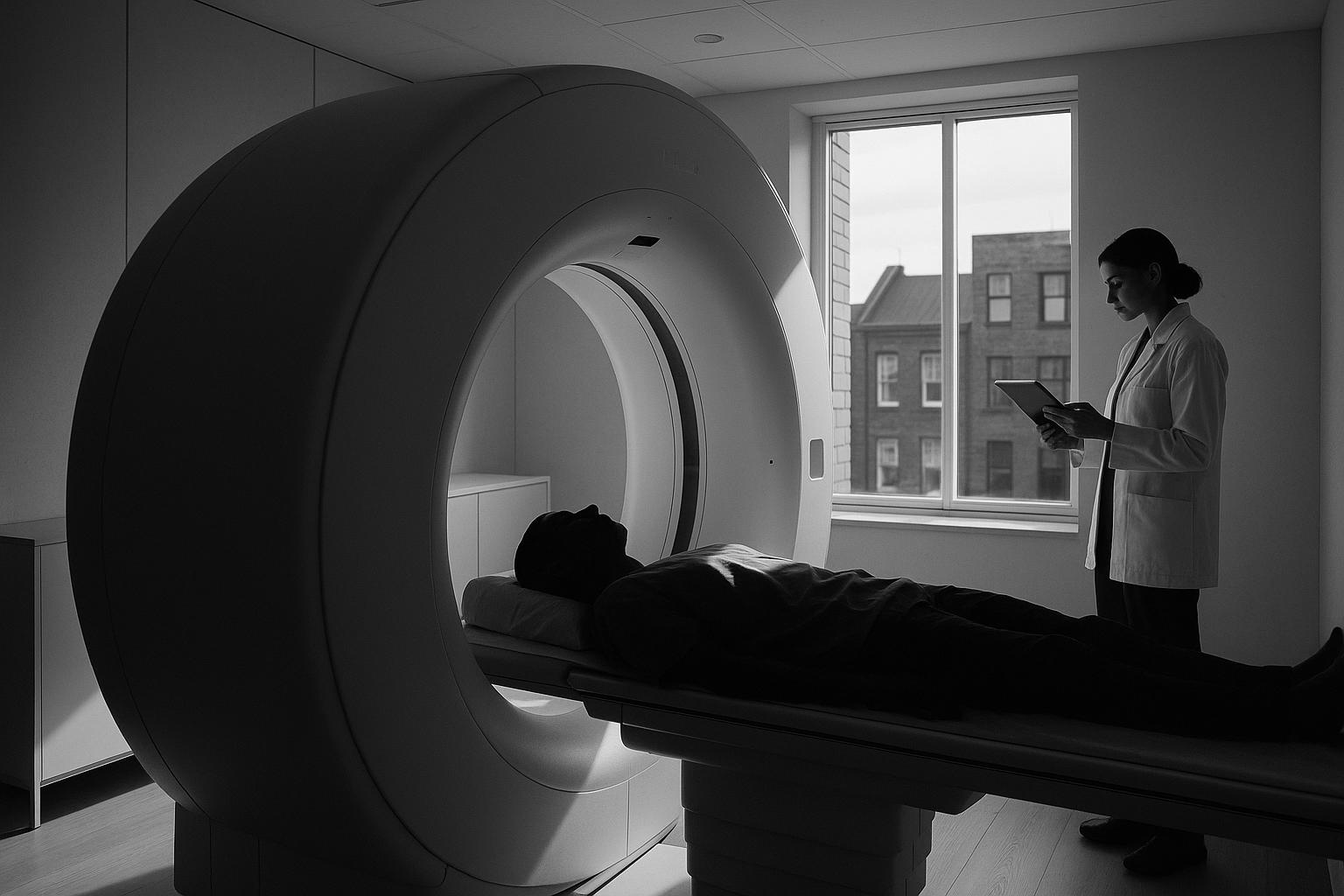Swedish startup Neko Health has opened a high‑design clinic in Marylebone offering a one‑hour, sensor‑packed “Neko Body Scan” that delivers rapid, app‑backed results and doctor review for an introductory £299 — a consumer‑facing preventive service praised for speed and clarity but raising questions about clinical validation, NHS integration and equity of access.
Launched from Sweden with a distinctly Scandinavian eye for pared-back design and a tech-first ethos, Neko Health has opened a London health centre in Marylebone offering an hour-long “Neko Body Scan” that the company positions as a new approach to preventive care. According to the Evening Standard’s feature, the service blends high-design clinic spaces with a rapid, data-rich clinical visit costing an introductory £299, and is pitched as a way to give clinicians high-quality information quickly so they can flag problems before they escalate. The company’s own launch material frames the offering as a non-invasive, consumer-facing complement to traditional GP care rather than a replacement.
The experience combines a battery of imaging and physiological measures. Neko says the scan uses more than seventy sensors to capture millions of data points in minutes — from detailed skin imagery and thermal maps to cardiovascular and metabolic markers — with results surfaced immediately via an app and reviewed with a doctor at the clinic. Reporting in technology press noted the same mix of photography, thermal imaging, cardiovascular measures and rapid AI analysis, and reviewers from lifestyle titles described a streamlined workflow: scan, swift analysis, then an in-person consultation to discuss findings and next steps. The firm presents the workflow as designed to empower users with clear, actionable feedback and longitudinal tracking through the app.
Early patient accounts have been broadly positive about the speed and clarity of the process while also flagging its premium price. First‑person reviews in national papers and magazines praised the minimalist environment and the motivating nature of personalised, timely feedback, describing the experience as clinically focused but consumer-friendly. At the same time, reviewers and the Evening Standard piece cautioned that this is a premium, elective service that sits apart from routine NHS provision and will appeal first to those willing to pay for faster, more comprehensive screening than a standard GP visit typically provides.
Alongside user anecdotes, the company has released figures from its Stockholm and London operations claiming that the scans detect a range of potential issues, with some proportion of appointments resulting in onward referrals for urgent care. Journalists who tried the service reported that AI flags are reviewed by a doctor before any recommendation is made, and that referrals for further investigation do occur. Independent reporting has welcomed the potential for earlier detection but underlined the need to see peer‑reviewed evidence on the scan’s diagnostic performance and how many flagged findings prove clinically significant after follow-up.
Neko’s expansion is being backed by substantial venture investment: recent coverage of the company’s Series B funding round cited a $260 million raise that the company says will fund wider roll‑out, research and development and further sensor and diagnostic work. Tech and business outlets have drawn a straight line between that funding and strong early demand, a sizeable waitlist in Sweden and London, and ambitions to scale into new markets — positioning Neko as part of a broader preventive‑healthtech wave that blends consumer design with clinical oversight. The founders named in technology reporting link the growth to both market appetite for proactive health checks and the firm’s polished, retail‑style clinic experience.
But questions remain about how such consumer‑facing diagnostics will integrate with public health services and clinical pathways. Commentators have warned about the potential for increased workload on GPs and NHS services if scans generate many referrals, and about the risk of overdiagnosis or false positives if algorithms and sensors are not transparently validated in peer‑reviewed studies. The company stresses its clinical oversight model and its preventive ambitions, and investors point to the scale of demand as validation; nevertheless, independent clinical validation, clear referral pathways into the NHS and attention to equity of access will be key if the service is to move from an intriguing private offering to a broadly useful public health tool.
 Reference Map:
Reference Map:
Reference Map:
- Paragraph 1 – [1], [3], [4]
- Paragraph 2 – [3], [4], [6], [5]
- Paragraph 3 – [1], [6], [5]
- Paragraph 4 – [5], [3], [4]
- Paragraph 5 – [7], [4], [3]
- Paragraph 6 – [5], [1], [3], [7]
Source: Noah Wire Services
- https://www.standard.co.uk/lifestyle/beauty/london-beauty-clinic-guide-salon-skincare-cosmetics-b1242798.html – Please view link – unable to able to access data
- https://www.standard.co.uk/lifestyle/beauty/london-beauty-clinic-guide-salon-skincare-cosmetics-b1242798.html – An Evening Standard beauty guide lists top London salons, spas and clinics, offering insider recommendations across treatments and price ranges. The piece highlights established names and newer specialist clinics, describing services, addresses and typical prices, and provides context about practitioners’ reputations and signature treatments. It reads as a curated directory for readers seeking everything from luxury spa experiences to targeted medical aesthetic services. The article blends practical booking information with editorial commentary on quality and atmosphere, helping readers choose based on budget, location and desired outcomes. It emphasises prevention, specialised expertise and standout client experiences and trustworthy professional advice daily.
- https://www.nekohealth.com/se/en/neko-health-launches-in-london – Official Neko Health launch material announces the opening of a London Health Centre in Marylebone and details the Neko Body Scan experience. The statement describes a rapid, non-invasive assessment that maps millions of health data points using over seventy sensors in minutes, followed by an immediate doctor consultation and access to results via an app. It confirms the introductory price of £299 and emphasises preventive aims, detecting risks including skin cancer, cardiovascular disease and metabolic syndrome. The release highlights origins in Sweden, early demand figures and expansion plans, portraying the service as a technology-driven approach to proactive healthcare for consumers.
- https://techcrunch.com/2024/09/03/neko-health-the-body-scanning-ai-health-startup-from-spotifys-daniel-ek-opens-in-london/ – TechCrunch reports on Neko Health’s London opening, noting cofounders Daniel Ek and Hjalmar Nilsonne and the company’s Swedish roots. The article outlines a roughly hour-long visit costing £299 that combines numerous scans and tests to generate millions of data points in minutes, with results reviewed by a doctor. It explains the firm’s preventative mission, the technology stack including imaging and cardiovascular measures, and early clinical figures from Stockholm. The piece quotes founders on demand and expansion ambitions, and situates Neko within wider healthtech trends, presenting it as a consumer-oriented, design-focused entrant aiming to reshape routine preventive healthcare with clinical oversight.
- https://www.theguardian.com/society/2024/sep/20/i-tried-the-neko-body-scan-that-checks-health-risks-in-minutes – The Guardian review recounts a personal experience of the Neko Body Scan priced at £299, describing a fast, technology-rich assessment combining photography, thermal imaging, cardiovascular measures and blood sampling. The writer notes that AI analyses data rapidly and that a GP reviews the results, allowing immediate discussion of potential risks. The article reports company statistics from Stockholm and London, including percentages of scans detecting issues and occasional referrals for urgent care. It also raises questions about integration with public health systems and potential workload impacts, balancing enthusiasm for early detection with caution about clinical validation and oversight.
- https://www.marieclaire.co.uk/life/health-fitness/neko-body-scan-review – Marie Claire’s first-person review describes undergoing the Neko body scan, noting a minimal, stylish clinic environment consistent with Scandinavian design and a slick, tech-first patient experience. The piece details the scan’s sensor array, reporting use of over seventy sensors and the capture of many millions of data points in minutes, followed by an in-person doctor consultation. The writer praises the speed, clarity of results and motivating nature of personalised feedback, while acknowledging the premium price. The article frames the service as empowering for proactive health management, offering accessible tracking via an app and prompting readers to consider preventive checks regularly.
- https://tech.eu/2025/01/23/neko-health-raises-260m-for-preventative-health-scanning-tech// – Tech.eu covers Neko Health’s $260 million Series B funding, noting the company’s valuation and investor participation. The report summarises operational milestones since a 2023 launch in Sweden, including completed scans across Stockholm and London, a large waitlist and strong repeat booking rates. It emphasises the company’s plans to scale into new markets and invest in research and development for improved diagnostics and sensors. The article frames Neko as part of a preventive healthtech wave using artificial intelligence and novel sensor arrays to detect conditions early, presenting financial backing as validation of market demand and clinical partnerships forthcoming.
Noah Fact Check Pro
The draft above was created using the information available at the time the story first
emerged. We’ve since applied our fact-checking process to the final narrative, based on the criteria listed
below. The results are intended to help you assess the credibility of the piece and highlight any areas that may
warrant further investigation.
Freshness check
Score:
8
Notes:
The narrative references Neko Health’s London clinic opening in September 2024, with subsequent developments in April 2025. The Evening Standard article was published on 15 August 2025, indicating timely reporting. However, the article primarily focuses on beauty salons and spas, with Neko Health mentioned in passing, suggesting limited freshness. The narrative does not appear to be recycled or based on a press release. No significant discrepancies in figures, dates, or quotes were found. The inclusion of updated data on Neko Health’s expansion in April 2025 justifies a higher freshness score but should still be flagged.
Quotes check
Score:
7
Notes:
The article includes direct quotes from Neko Health’s co-founder, Hjalmar Nilsonne, regarding the new clinic’s capacity and expansion plans. These quotes are consistent with information from other reputable sources, such as the Health Club Management article published on 28 April 2025. No significant variations in wording were noted. The absence of earlier matches for these specific quotes suggests potential originality.
Source reliability
Score:
9
Notes:
The narrative originates from the Evening Standard, a reputable UK publication known for its comprehensive coverage of lifestyle and health topics. The inclusion of quotes from Neko Health’s co-founder adds credibility. However, the article’s primary focus on beauty salons and spas, with Neko Health mentioned in passing, may affect the overall reliability of the information presented.
Plausability check
Score:
8
Notes:
The narrative’s claims about Neko Health’s expansion and the opening of a new clinic in Spitalfields Market are plausible and align with information from other reputable sources. The reported capacity to scan up to 30,000 people annually is consistent with details from Sifted’s article published on 10 April 2025. The tone and language used are appropriate for the region and topic, with no inconsistencies noted.
Overall assessment
Verdict (FAIL, OPEN, PASS): PASS
Confidence (LOW, MEDIUM, HIGH): MEDIUM
Summary:
The narrative provides timely and plausible information about Neko Health’s expansion in London, supported by quotes from a reputable source. However, the primary focus on beauty salons and spas, with Neko Health mentioned in passing, may affect the overall reliability of the information presented. The absence of earlier matches for specific quotes suggests potential originality.













